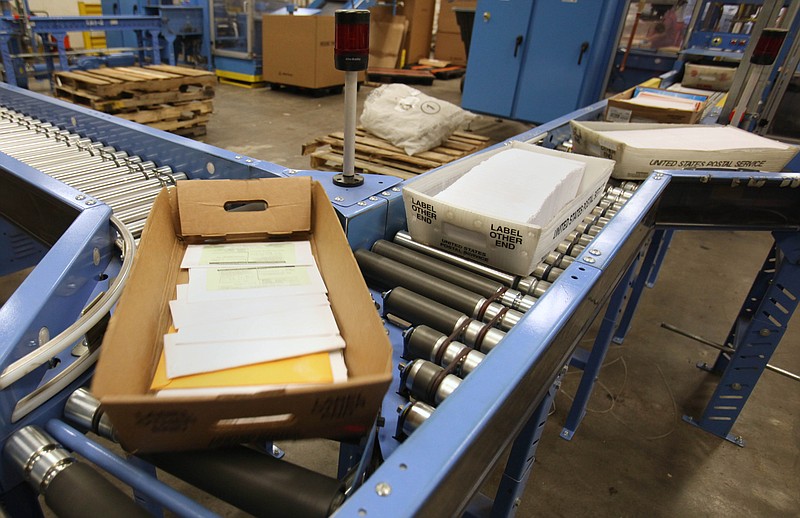NASHVILLE - Two new polls show most Tennesseans support being able to vote by mail amid the coronavirus pandemic even as state Attorney General Herbert Slatery appeals a Nashville chancellor's ruling that expands absentee voting by mail to all 4.1 million of the state's registered voters.
A May 26 online survey of 740 likely voters, conducted on behalf of the nonpartisan group Secure Democracy, found a super majority - 67% - saying they support keeping polling locations open while also "giving all voters the option to vote absentee."
Another 31% said they were opposed to it. The survey's margin of error is plus or minus – 3.67%.
On Tuesday, Vanderbilt University released its annual spring survey. Conducted May 5-25, the poll of 1,000 registered Tennessee voters found 57% strongly or somewhat supported voting by mail. Another 42% strongly or somewhat said they opposed it.
The poll's margin of error is plus or minus 3.8%.
Secure Democracy, which advocates for safe and secure elections, says it seeks to work across the political aisle with partners in a number of states for "common-sense policy solutions" to safeguard elections and ensure "every legal vote is counted."
Shanna Singh Hughey, president of Nashville-based Think Tennessee, which is a state partner on the polling here, said in a statement that "Tennessee is one of just five states that will require most voters to appear in person to cast their ballots.
"But this poll confirms that Tennesseans, too, want the freedom to choose how to cast their ballots during the pandemic. With our elections quickly approaching, now is the time to implement solutions for the state that, last presidential election, ranked #49 for voter turnout."
Vanderbilt Poll Director Dr. John Geer said their survey's finding "underscores that not all issues spark a partisan response. Tennesseans, collectively, have an underlying commitment to democracy."
Respondents to the Vanderbilt survey had even stronger support for increasing Tennessee's period of early voting, which allows any registered voters to cast their ballots during a 15-day period before actual election day.
Eighty-five percent of those surveyed strongly or somewhat support that with 52% saying they strong support expansion of the timeframe. Just 15% somewhat or strongly opposed the expansion.
As of Tuesday afternoon, the state health department reported an additional 631 people had tested positive for COVID-19 over Monday, raising the total number of infections to 27,575 with 18,013 persons recovered. The number of deaths rose by 14 Tuesday to 425. Infections have been on the rise in Chattanooga.
In a ruling last week that shook up Tennessee's longstanding stance on absentee voting by mail-in ballot, Davidson County Chancellor Ellen Hobbs Lyle held the state's limits on absentee voting during the pandemic constitute "an unreasonable burden on the fundamental right to vote guaranteed by the Tennessee Constitution."
Not long afterward, Slatery's office issued a statement saying the court's ruling "while rightly taking into account the safety of Tennessee's voters and poll workers, failed to appropriately consider the extensive safety measures of the COVID-19 election plan, and, more importantly, gave little weight to the unanimous expertise of state and county election officials that hastily expanding absentee voting is impracticable and risks disenfranchising Tennessee voters."
Slatery, a Republican who was then-Gov. Bill Haslam's legal counsel and later appointed by the five-member Tennessee Supreme Court in 2014, sharply criticized the ruling by Lyle, an elected judge.
"It is yet another court decision replacing legislation passed by the people's elected officials with its own judgment, largely ignoring the practicalities of implementing such a decision, and doing so in the midst of a pandemic and budget crisis," Slatery said in his own statement.
Slatery originally sought to bypass the Tennessee Court of Appeals and go directly to the state Supreme Court. The state's high court, however, directed he go through the regular appellate process.
After last week's ruling, State Election Coordinator Mark Goins, who works for Tennessee Secretary of State Tre Hargett, told local officials in an email to "hold off" on sending absentee voting applications until his office could revise its forms or seek a stay in the judge's order.
The Tennessee Journal reported Tuesday that plaintiffs in the lawsuit over the state's absentee voting law have now filed a contempt motion against the state, alleging violations of Chancellor Lyle's order to immediately begin providing mail-in ballots to anyone who asks for one.
The state had created a new category on its ballot application form allowing voters to be able to request to vote by mail if they have "determined it is impossible or unreasonable to vote in-person at a polling place due to the COVID-19 situation, and therefore qualify as hospitalized, ill, or disabled and unable to appear at your polling place."
According to The Tennessee Journal, plaintiffs in the suit argued the creation of that category wasn't allowable under Lyle's ruling and contained no definition for the "impossible or reasonable" standard. They also argued that there also are no provisions for anyone to certify they can't vote in person because they are providing care to someone else.
"This unilateral disregard of the Court's Order is designed to place increased scrutiny on voters who wish to do nothing more than to rely on this Court's Order, lead to voter confusion and intimidation, and enable the state to segregate these voters' absentee ballot requests and refrain from processing them," the motion states.
Contact Andy Sher at asher@timesfreepress.com or 615-424-0484. Follow on Twitter @AndySher1.
